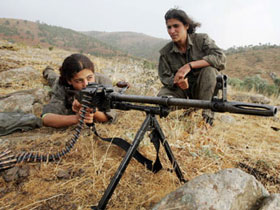 Especially for the last 20 years, there is a concept called "Islamic terror" on the agenda of the Western world. The terrorist attacks, which were organized against the two big cities of the United States of America on September 11, 2001 and resulted in the death of tens of thousands of innocent people, brought this concept to the world agenda once more.
Especially for the last 20 years, there is a concept called "Islamic terror" on the agenda of the Western world. The terrorist attacks, which were organized against the two big cities of the United States of America on September 11, 2001 and resulted in the death of tens of thousands of innocent people, brought this concept to the world agenda once more.
As Muslims, we strongly condemn these attacks and we offer our condolences to the American nation. This article explains that the source of the violence that we condemn is definitely not Islam.
A point that needs to be primarily indicated is that it is not clear who carries out this act. This felonious attack can be the act of very different focus groups. It could be a communist organization that hates American values or a fascist one that protests against federal administration. It could be the result of a hidden fraction in other countries. Even if the terrorists who hijacked the planes carry Muslim names, the question of who used them for what purpose will continue to remain a mystery.
Even if terrorists have Muslim names and identities, the murders they perpetrate cannot be labelled "Islamic terror", just as it could not be called "Jewish terror" if the perpetrators were Jews or "Christian terror" if they were Christians. That is because murdering innocent people in the name of a Divine religion is impossible. Unless forgiven by Allah, murdering innocent people is a great sin that brings endless torment in Hell. A person who believes in religion and has fear of Allah cannot do something like this.
The perpetrators can commit such violence only with the intention of attacking religion itself. It may well be that those who carry out such violence do so to present religion as evil in the eyes of people and to generate hatred and reaction towards the religious. Consequently, every attack on innocent people having a "religious" facade is actually an attack made against religion.
Religion commands love, mercy and peace. Terror, on the other hand, is the opposite of religion; it is cruel, merciless and demands bloodshed, murder and misery. This being the case, the origins of a terrorist act should be sought in disbelief rather than in religiousness. The origins should be sought in fascist, communist, racist or materialist outlook on life. The name or the identity of the triggerman is not important. If he can kill innocent people without blinking an eye, then he is an unbeliever, not a believer. He is a murderer with no fear of Allah, whose main ambition is to shed blood and to cause harm. For this reason, "Islamic terror" is an erroneous concept which contradicts Islam's message. The religion of Islam by no means countenances terror. On the contrary, terror (i.e. murders committed against innocent people) in Islam is a great crime and Muslims are responsible for preventing these acts and bringing peace and justice to the world.

Command of war in the Qur'an
According to the Qur'an, war is a last resort and an "undesired necessity" to be waged within specific humanitarian and moral bounds. One verse describes how it is deniers of Allah who instigate the wars in the world, and that war is not pleasing to Allah:
"... Each time they kindle the fire of war, Allah extinguishes it. They rush about the earth corrupting it. Allah does not love corrupters." (Surat al-Ma'ida, 64)
When we look at the life of the Prophet Muhammad (saas), we see that war was resorted to only when unavoidable and for defensive purposes alone.
The revelation of the Qur'an to the Prophet (saas) took 23 years. During the first 13 years, Muslims lived as a minority in the pagan order in Mecca, and were subjected to severe oppression. Many Muslims suffered physical torture, some were killed, most had their goods and homes plundered, and they were subjected to constant insults and threats. Nonetheless, Muslims continued to live without resorting to violence and always called on the pagans to live in peace.
Eventually, when the oppression inflicted by the pagans became unbearable, the Muslims migrated to the city of Yathrib (later Medina), where they encountered a freer and friendlier climate and where they established their own administration. Even after setting up their own political structure, they still did not resort to arms against the aggressive pagans of Mecca. Only after the revelation of the following verse did the Prophet (saas) command his community to ready themselves for war:
"Permission to fight is given to those who are fought against because they have been wronged—truly Allah has the power to come to their support—those who were expelled from their homes without any right, merely for saying, 'Our Lord is Allah'… " (Surat al-Hajj, 39-40)
In short, Allah gave the Muslims permission to wage war because they had suffered oppression and cruelty. To put it another way, the war permitted to them was for defensive purposes only. In other verses, Muslims were warned to avoid unnecessary provocation or the use of unnecessary violence:
"Fight in the way of Allah against those who fight you, but do not go beyond the limits. Allah does not love those who go beyond the limits." (Surat al-Baqara, 190)
Following the revelation of these verses, wars between the Muslims and the pagan Arabs took place. None of these wars were provoked by the Muslims. Moreover, the Prophet (saas) established a climate of peace and security and a social structure in which they could live in peace with the pagans by concluding a peace treaty, namely the Treaty of Hudaybiyyah, in which many of the pagans' demands were accepted. It was the pagans who broke this treaty, at which a new war broke out. Due to the rapid rise in the number of Muslims, the Islamic army achieved a strength that the pagan Arabs were unable to withstand, and the Prophet (saas) advanced on Mecca with that powerful force and duly captured it. No blood was shed in the course of that conquest, and not a single nose was caused to bleed. Impressed by this elevated character of his, the pagans later turned to Islam of their own free will.
This peaceable and moderate policy of the Prophet Muhammad's (saas) stemmed from the essence of Islam as revealed by Allah in the Qur'an. In the Qur'an, Allah commands believers to treat non-Muslims well:
"Allah does not forbid you from being good to those who have not fought you in the religion or driven you from your homes, or from being just towards them. Allah loves those who are just. Allah merely forbids you from taking as friends those who have fought you in the religion and driven you from your homes and who supported your expulsion…" (Surat al-Mumtahana, 8-9)
The verses above clarify the approach of Muslims to non-Muslims: A Muslim should treat all non-Muslims kindly and only avoid making friends with those who show enmity towards Islam. In a case where this enmity causes violent attacks against Muslim existence, which becomes a cause of war, then Muslims should wage this war justly by considering the humane dimensions of the situation.
The Meaning of the Concept of Jihad in the Qur'an:
Another relevant concept essential to be shed light on is that of "jihad."
The word actually means "struggling." In other words, according to Islam, waging jihad means "endeavoring or making great efforts." The Prophet (saas) has informed us that the greatest jihad is the one waged against one's own lower self. The lower self implies one's selfish passions and greed. An intellectual struggle against anti-religious and atheistic ideas is also definitely a jihad.
Beside such intellectual and moral meanings, war as a physical struggle is also a "jihad". However, this war has to be for defense purposes or a limited one as we have described above. The concept of jihad to be used to define an act of violence against innocent people, meaning terror, is a very big and unjust distortion.
To sum up the facts we have seen so far, the "political doctrine" of Islam (in other words, Islamic rules and principles regarding political matters) is exceedingly moderate and peace loving. This truth is also accepted by many non-Muslim historians and theologians. One of these is the British historian Karen Armstrong, a former nun and an expert on Middle East history. In her book Holy War, she makes the following comments on the subject:
... The word 'Islam' comes from the same Arabic root as the word 'peace' and the Koran condemns war as an abnormal state of affairs opposed to God's will… Islam does not justify a total aggressive war of extermination… Islam recognises that war is inevitable and sometimes a positive duty in order to end oppression and suffering. The Koran teaches that war must be limited and be conducted in as humane a way as possible... When Mohammad sent his freedman Zaid against the Christians at the head of a Muslim army, he told them to fight in the cause of God bravely but humanely. They must not molest priests, monks and nuns nor the weak and helpless people who were unable to fight. There must be no massacre of civilians nor should they cut down a single tree nor pull down any building. (Karen Armstrong, Holy War, MacMillan London Limited, 1988, p. 25)
Following the death of the Prophet (saas) Muslims continued to display exceptional tolerance and respect towards members of other faiths. Both Christians and Jews lived securely and freely in Islamic states. Muslims have never been mischief-makers in history; on the contrary they have brought security and peace to people of every nationality and faith wherever they go to. (For detailed information please see: Harun Yahya, Justice and Tolerance in the Qur'an, Vural Publishing, 2003)
In short, the basis of Qur'anic morality is to establish tolerance, peace and mercy and Islam aims to clear the world of mischief. The commands of the Qur'an and enforcement of these by Muslims throughout history is peremptorily loud and clear. (For detailed information see: www.islamdenouncesterrorism.com)
.jpg)


